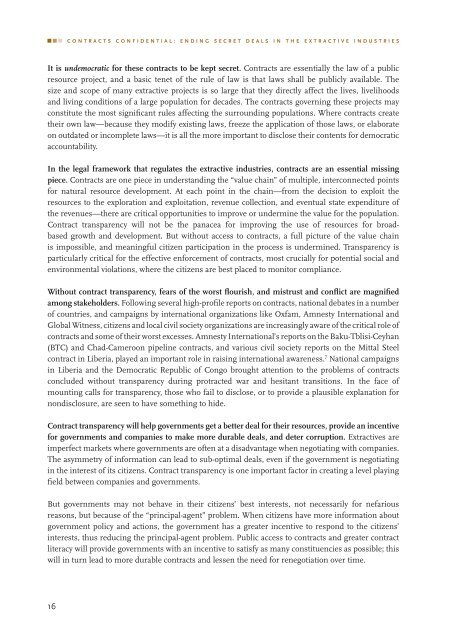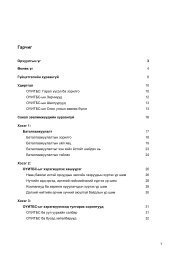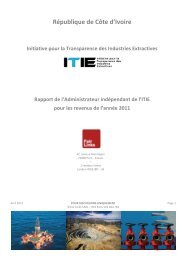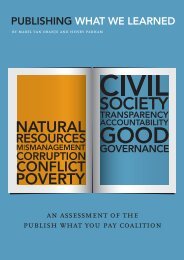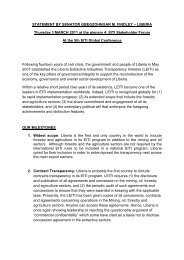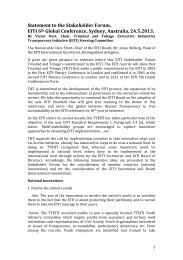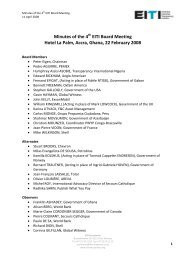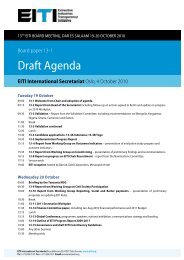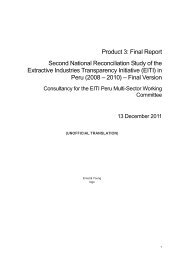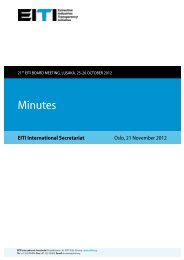CONTRACTS CONFIDENTIAL: - Good Law and Practice
CONTRACTS CONFIDENTIAL: - Good Law and Practice
CONTRACTS CONFIDENTIAL: - Good Law and Practice
You also want an ePaper? Increase the reach of your titles
YUMPU automatically turns print PDFs into web optimized ePapers that Google loves.
16<br />
<strong>CONTRACTS</strong> <strong>CONFIDENTIAL</strong>: ENDING SECRET DEALS IN THE EXTRACTIVE INDUSTRIES<br />
It is undemocratic for these contracts to be kept secret. Contracts are essentially the law of a public<br />
resource project, <strong>and</strong> a basic tenet of the rule of law is that laws shall be publicly available. The<br />
size <strong>and</strong> scope of many extractive projects is so large that they directly affect the lives, livelihoods<br />
<strong>and</strong> living conditions of a large population for decades. The contracts governing these projects may<br />
constitute the most significant rules affecting the surrounding populations. Where contracts create<br />
their own law—because they modify existing laws, freeze the application of those laws, or elaborate<br />
on outdated or incomplete laws—it is all the more important to disclose their contents for democratic<br />
accountability.<br />
In the legal framework that regulates the extractive industries, contracts are an essential missing<br />
piece. Contracts are one piece in underst<strong>and</strong>ing the “value chain” of multiple, interconnected points<br />
for natural resource development. At each point in the chain—from the decision to exploit the<br />
resources to the exploration <strong>and</strong> exploitation, revenue collection, <strong>and</strong> eventual state expenditure of<br />
the revenues—there are critical opportunities to improve or undermine the value for the population.<br />
Contract transparency will not be the panacea for improving the use of resources for broadbased<br />
growth <strong>and</strong> development. But without access to contracts, a full picture of the value chain<br />
is impossible, <strong>and</strong> meaningful citizen participation in the process is undermined. Transparency is<br />
particularly critical for the effective enforcement of contracts, most crucially for potential social <strong>and</strong><br />
environmental violations, where the citizens are best placed to monitor compliance.<br />
Without contract transparency, fears of the worst flourish, <strong>and</strong> mistrust <strong>and</strong> conflict are magnified<br />
among stakeholders. Following several high-profile reports on contracts, national debates in a number<br />
of countries, <strong>and</strong> campaigns by international organizations like Oxfam, Amnesty International <strong>and</strong><br />
Global Witness, citizens <strong>and</strong> local civil society organizations are increasingly aware of the critical role of<br />
contracts <strong>and</strong> some of their worst excesses. Amnesty International’s reports on the Baku-Tblisi-Ceyhan<br />
(BTC) <strong>and</strong> Chad-Cameroon pipeline contracts, <strong>and</strong> various civil society reports on the Mittal Steel<br />
contract in Liberia, played an important role in raising international awareness. 7 National campaigns<br />
in Liberia <strong>and</strong> the Democratic Republic of Congo brought attention to the problems of contracts<br />
concluded without transparency during protracted war <strong>and</strong> hesitant transitions. In the face of<br />
mounting calls for transparency, those who fail to disclose, or to provide a plausible explanation for<br />
nondisclosure, are seen to have something to hide.<br />
Contract transparency will help governments get a better deal for their resources, provide an incentive<br />
for governments <strong>and</strong> companies to make more durable deals, <strong>and</strong> deter corruption. Extractives are<br />
imperfect markets where governments are often at a disadvantage when negotiating with companies.<br />
The asymmetry of information can lead to sub-optimal deals, even if the government is negotiating<br />
in the interest of its citizens. Contract transparency is one important factor in creating a level playing<br />
field between companies <strong>and</strong> governments.<br />
But governments may not behave in their citizens’ best interests, not necessarily for nefarious<br />
reasons, but because of the “principal-agent” problem. When citizens have more information about<br />
government policy <strong>and</strong> actions, the government has a greater incentive to respond to the citizens’<br />
interests, thus reducing the principal-agent problem. Public access to contracts <strong>and</strong> greater contract<br />
literacy will provide governments with an incentive to satisfy as many constituencies as possible; this<br />
will in turn lead to more durable contracts <strong>and</strong> lessen the need for renegotiation over time.


